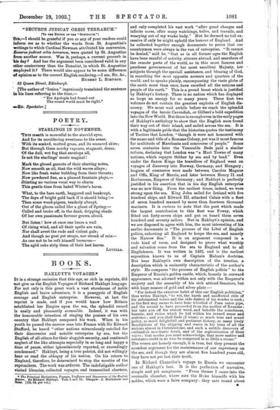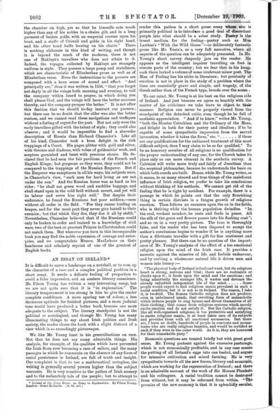BOOKS.
HAKLUYT'S VOYAGES.* IT is a strange omission that this age, so rich in reprints, did mot give us the English Voyages of Richard Hakluyt long ago. For not only is this great work a vast storehouse of noble English and brave adventure, it is a panegyric of English courage and English enterprise. However, at last the reprint is made, and if you would know how Britain established her Empire upon the sea, the splendid record is easily and pleasantly accessible. Indeed, it was with the honourable intention of singing the praises of his own country that Hakluyt composed his work. When in his youth he passed the narrow seas into France with Sir Edward Stafford, he heard " other nations miraculously extolled for their discoveries and notable enterprise by sea, but the English of all others for their sluggish security, and continuall neglect of the like attempts especially in so long and happy a time of peace, either ignominiously reported, or exceedingly condemned." Hakluyt, being a true patriot, did not willingly leer or read the obloquy of his nation. On his return to England, therefore, he determined to stop the mouths of the reproachers. The work was arduous. The indefatigable author visited libraries, collected voyages, and transcribed charters, • . The Principal Narigations, Voyages, Traffigues and Discorertes of the English Nation. By Richard Hakluyt. Vols. L and II. Glasgow : J. MacLehose and Hone. [12s. 6d. per vol.]
and only completed his vast work "after great charges and infinite cares, after many watchings, toiles, and travails, and wearying out of my weake body." But he deemed no toil ex- cessive if only he might uphold the honour of England. And he collected together enough documents to prove that our countrymen were always in the van of enterprise. "It cannot be denied," said he, " that as in all former ages the English have bene manful of activity, stirrers abroad, and searchers of the remote parts of the world, so in this most famous and peerlesse governement of her most excellent Majesty, her - subjects through the speciall assistance, and blessing of God, in searching the most opposite corners and quarters of the world, and to speake plainly, encompassing the waste globe of
the earth more than once, have excelled all the nations and people of the earth." This is a proud boast which is justified by Hakluyt's history. There is no nation which has displayed so large an energy for so many years. These first two
volumes do not contain the greatest exploits of English dis- covery. We must wait awhile before we reach the splendid voyages of the heroic Cavendish, or Gilbert's bold expedition into the New World. But there is enough even in the early pages of Hakluyt's anthology to show that the English soon found their way out of their island, and sailed across the sea. It is with a legitimate pride that the historian quotes the testimony of Tacitus that London, "though it were not honoured with the name and title of a Romane Colony, yet was it most famous
for multitude of Merchants and concourse of people." Some seven centuries later the Venerable Bede paid a similar tribute, declaring that London was " a Mart Towne of many
nations, which repayre thither by sea and by land." Even under the Saxon Kings the travellers of England went on voyages of discovery into Norway, Germany, and Hungary ; leagues of commerce were made between Carolus Magma and Offa, King of Mercia, and later between Henry H. and Barbarossa, Emperor of Germany ; and Hakluyt is perfectly justified in his assertion that in his day English enterprise was no new thing. From the earliest times, indeed, we were strong upon the sea. King John sailed for Ireland with five hundred ships, and Edward III. attacked Calais with a fleet of seven hundred manned by more' than fourteen thousand mariners. It is curious to note that the port which made the largest contribution to this fleet was Fowey, which
fitted out forty-seven ships and put on board them seven hundred and seventy sailors. But in Hakluyt's opinion, and
we are disposed to agree with him, the most interesting of his earlier documents is " The process of the Libel of English policie, exhorting all England to keepe the sea, and namely the Narrow Sea." It is an argument composed in a rude kind of verse, and designed to prove what worship and salvation come from the sea to England and to all Englishmen. It was written in 1432, and is the earliest exposition known to us of Captain Mahan's doctrine. But hear Hakluyt's own description of the treatise, a. description which is eminently characteristic of the author's style. He compares " the process of English policie " to the Emperor of Russia's golden castle, which, homely in outward appearance, was adorned within not only with the Emperor's majesty and the assembly of his rich attired Senators, but with huge masses of gold and silver plate :-
"For indeed the exteriour habit of this our English politician," thus writes Ilakluyt, "to wit, the harsh and unaffected stile of his substantiall verses and the olde dialect of his worries is such; as the first may secina to have bene whistled of Pans oaten pipe, and the second to have proceeded from the mother of Evander : but take you off his utmost weed, and beholds the comeliness, beautie, and riches which lie hid within his inward sense and sentence ; and you shall finde (I wisse) so much true and sound policy, so much delightful! and pertinent history, so many lively descriptions of the shipping and wares in his time of all the nations almost in Christendoine, and such a subtile discovery of outlandish merchants fraud, and of the sophistication of their wares ; that needes you must acknowledge, that more matter and substance could in no wise be comprised in so little a roome."
The verses are homely enough, it is true, but they present the soundest argument for the maintenance of our supremacy on
the sea, and though they are almost five hundred years old, they have not yet lost their truth.
In Richard Chancelor's voyage to Russia we encounter one of Hakluyt's best. It is the perfection of narrative, simple and yet sumptuous. " From thense I came into the counsaile chamber, where sate the Duke himselfe with his nobles, which were a faire company : they sate round about the chamber on high, yet so that he himselfe sate much higher than any of his nobles in a chaire gilt, and in a long garment of beaten golde, with an emperial crown upon his head, and a stain of Cristall and golde in his right hand, and his other hand halfe leaning on his chaire." There is nothing elaborate in this kind of writing, and though it is beyond the reach of the moderns, there is not one of Hakluyt's travellers who does not attain to it. Indeed, the voyages collected by Hakluyt are strangely uniform in style. They possess a large pomp and stateliness, which are characteristic of Elizabethan prose as well as of Elizabethan verse. Even the instructions to the pursers are composed with a keen sense of sound and effect. " And principally see," thus it was written in 1556, " that you forget not dayly in all the voiage both morning and evening, to call the company within boord to prayer, in which doing you shall please God, and the voiage will have the better successe thereby, and the company prosper the better." It is not after this fashion that we should to-day instruct our pursers ; , but there can be no doubt that the older was also the better custom, and we cannot read these navigations and traffiques without a feeling of regret for the past. But not only were the' varly travellers gifted with the talent of style ; they could also observe ; and it would be impossible to find a shrewder description of Russia than Richard Chancelor's. Like all of his kind, Chancelor took a keen delight in the rich' trappings of a Court. His pages glitter with gold and silver, with thrones and diadems, with robes of goldsmiths' work, and sceptres garnished and beset with precious stones. He de- dared that he had seen the fair pavilions of the French and English Kings ; but gorgeous as they were, they could not be compared to the trappings of the Russian Emperor. But if the Emperor was sumptuous in all his ways, his subjects were, in Chancelor's view, " such men for hard living as are not under the sun." And the Russian horse was as hard as his rider : " he shall eat green wood and suchlike baggage, and shall stand open in the cold field without covert, and yet will 'he labour and serve him right well." But despite their endurance, he found the Russians but poor soldiers,—men without all order in the field. " For they roam hurling on heapes, and for the most part they never give battell to their enemies; but that which they doe, they doe it all by stelth." Nevertheless, Chancelor believed that if the Russians could only be broken to order and trained to a knowledge of civil wars, two of the best or greatest Princes in Christendom could not match them. But wherever you turn in this incomparable book you may find the noble expression of courage and enter- prise, and we congratulate Messrs. MacLehose on their liandsome and scholarly reprint of one of the greatest of English books.



















































 Previous page
Previous page